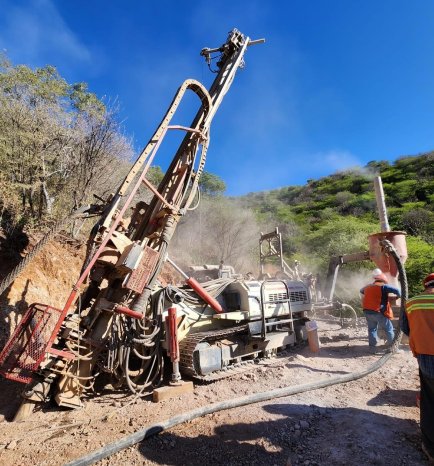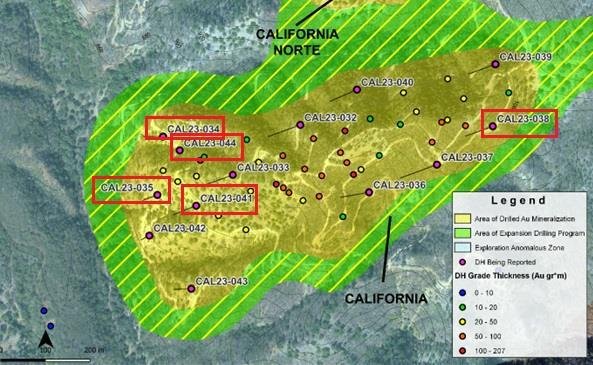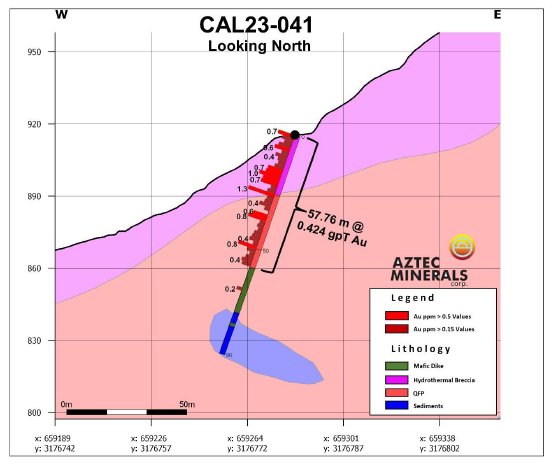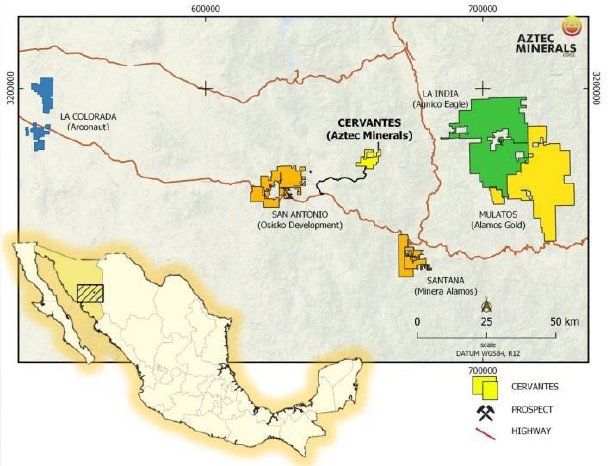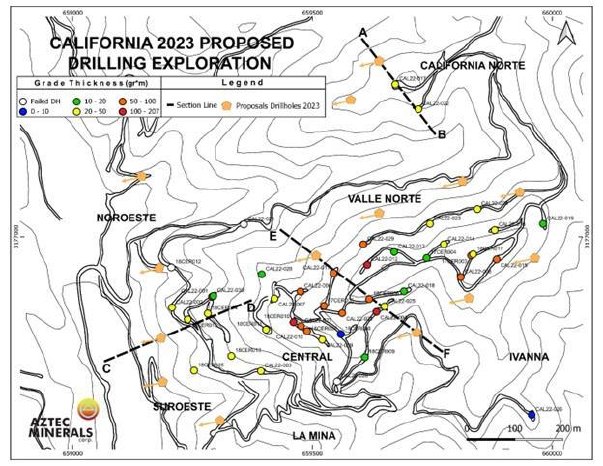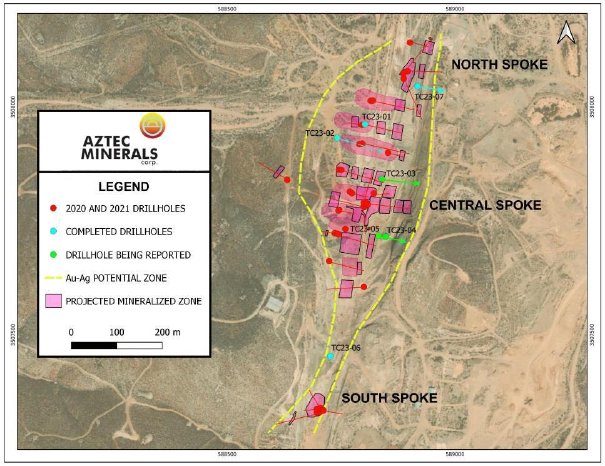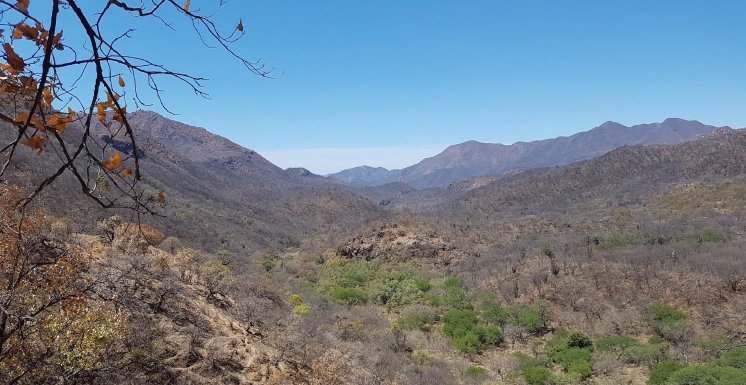All pictures are company material, unless stated otherwise.
All currencies are in US Dollars, unless stated otherwise.
Please note: the views, opinions, estimates, forecasts or predictions regarding Aztec’s resource potential are those of the author alone and do not represent views, opinions, estimates, forecasts or predictions of Aztec or Aztec’s management. Aztec has not in any way endorsed the views, opinions, estimates, forecasts or predictions provided by the author.
Aztec Minerals announced the results of the last 13 hole RC drill program in two batches, one about 3 holes on January 18, 2023 and one about 10 holes on January 30, 2023. The program was designed as a cautious step-out program, exploring the mineralized envelope outwards in all directions for another 50m, and all holes intersected oxidized gold mineralization, often close to surface. Highlights of the program showed the following results:
- CAL23-034: 30.4m @ 1.03g/t Au
- CAL23-035: 47.12 m @ 0.51 g/t Au
- CAL23-041: 57.76 m @ 0.42 g/t Au
- CAL23-044: 59.44 m @ 0.28 g/t Au
- CAL23-038: 109.44m @ 0.205g/t Au
The encountered gold mineralization is characterized by oxidized and unoxidized stockwork veinlets and disseminated sulfide sites, with silicification and phyllic alterations. Potassic alteration is present in places and is associated with mineralization as well. The company continues exploration on the potential step-out areas (green zone) to support future delineation of new drilling targets in the vicinities of the drilled area, aiming to define a larger, potentially amenable to heap leaching, gold mineralized zone. The gold mineralization is interpreted as an oxide cap, located on top of an underlying porphyry target. Interesting here is the potassic alteration. Knowledgeable readers might recognize this from the exploration strategy used by Hercules Silver (BIG.V), aiming at a potassic core in order to find a high grade porphyry target below their silver oxide cap.
Although the grades of the recent drilling were lower and intercepts shorter than previous drilling, obtained data further supported the concept that much of the metasediments intersected are unconnected blocks as xenoliths within the California intrusive porphyry complex as relicts of its piercement by its uppermost levels. It is also being shown that the metasediments, specifically the quartzites, can host gold mineralization which hadn’t been well evidenced before.
What this means, is the uneconomic intercepts drilled in some of the holes are not necessarily the boundaries of the mineralized zone. Since the California North zone has prospective mineralization in 2 drill holes, it looks as if the company will continue a northward expansion and connection of the two zones with future grid drilling. The section of hole 041 provides clues to more mineralization down the slope of the ridge, although of lesser thickness compared to the ridge itself, as hydrothermal breccias continue into the valley to the west.
The results recently reported could very well add another 100-125koz Au, so my estimated total for California stands at 1.1Moz+ Au at the moment. Anything above 1Moz oxidized gold is an interesting addition to nearby heap leach operations in my view.
On a sidenote: keep in mind Alamos Gold is a natural suitor for the Cervantes project in my view, as its Mulatos operation is within trucking distance.
After Aztec Minerals completed 1,631m of RC drilling in the latest program called 3A, CEO Simon Dyakowski explained that there are permits in place for an additional approximate 15 holes and 2500m of drilling. The company will spend a couple of months in the field during the dry season to determine the specific targets of a follow up program integrating the results of the recent drilling.
The summer of this year is reserved for further technical studies, reconnaissance work on other targets, channel sampling and geologic mapping of the new drill roads at California and other targets around the target area to expand surface sampling and mapping on the property in general, potential metallurgical testing and finally the Cervantes phase 3B RC drilling program of approximately 15 drillholes comprising 2,500m including California Norte and Jasper, subject to market conditions and financing. CEO Dyakowski had this to comment on eventual deep drilling of porphyry targets: “Basically the entire zone is a porphyry target, as we are at the highest levels of the system. It is too early to tell if we will drill deeper in phase 3B as we have not modelled or interpreted the recent drilling data. It is dependent on many factors.”
Aztec Minerals is also working on interpretation and drill targeting for Tombstone at the moment, which CEO Dyakowski expects to shape up during Q1, 2024, but with no current drill program in mind yet. This will likely depend on the markets according to him, if the markets are positive it will be easier to raise enough cash to fund a drill program for Tombstone this year.
My global estimate for the mineralized envelope for Tombstone stands at a hypothetical 700koz Au. Future drilling is expected to focus on targeting step-outs to the west, filling in gaps, and deeper CRD targets, more specifically on strike and dip extensions of the shallow oxide mineralization, and move deeper to test for larger, deeper "Taylor-type" CRD targets along and adjacent to the Contention structure.
Conclusion
Aztec Minerals completed a third drill program at its flagship Cervantes project, more specifically at its California target, slightly expanding the mineralized zone with growth in most directions with predominantly oxidized material. Although grades and lengths in this particular program were less than previous campaigns, they added mineralization again, and do not necessarily indicate a boundary of mineralization. There seems to be an estimated 1.1Moz + Au heap leach potential for nearby, large strategic shareholder Alamos Gold, or eventual competitors. Besides this, there also appears to be significant potential at depth, and keep in mind Aztec has a second oxide gold project, this time with CRD potential, Tombstone in Arizona. Stay tuned!
I hope you will find this article interesting and useful, and will have further interest in my upcoming articles on mining. To never miss a thing, please subscribe to my free newsletter at www.criticalinvestor.eu, in order to get an email notice of my new articles soon after they are published.
Disclaimer:
The author is not a registered investment advisor, and currently has a position in this stock. Aztec Minerals is a sponsoring company. All facts are to be checked by the reader. For more information go to www.aztecminerals.com and read the company’s profile and official documents on www.sedar.com, also for important risk disclosures. This article is provided for information purposes only, and is not intended to be investment advice of any kind, and all readers are encouraged to do their own due diligence, and talk to their own licensed investment advisors prior to making any investment decisions.
